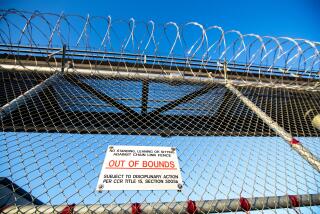Ft. Hood suspect should be forcibly shaved, prosecutors say
HOUSTON -- Ft. Hood shooting suspect Maj. Nidal Hasan should be forcibly shaved of his beard before his trial begins to avoid a âdistracting and disruptive sideshowâ that is âflagrantly disrespecting the Army,â military prosecutors said Wednesday.
Military prosecutors, in a response to a court of appeals ruling staying Hasanâs court martial, argue that Hasanâs refusal to follow orders to shave is not a question of religious freedom, but of decorum and authority.
âThis is a direct challenge to the military judgeâs authority,â prosecutors said in court documents. ââŚThe military has long recognized the authority of the court martial to compel an accused to appear in the proper uniform to maintain the decorum of the court.â
A military appeals court stayed the trial last week after judges found that forcibly shaving Hasan, as the military trial judge Col. Gregory Gross had ordered, would violate his religious freedom.
The United States Court of Appeals for the Armed Forces -- a panel of four civilian judges appointed by the president and based in Washington -- issued the order at the same time Hasan was appearing in court last Wednesday at the base in central Texas. The appeals panel, the highest court in the military system, is the equivalent of a federal Circuit Court of Appeal.
Hasan, 41, a Muslim American born to Palestinian parents, had appeared in court that day with a full salt-and-pepper beard, in uniform. He is charged with 13 counts of premeditated murder and 32 counts of attempted premeditated murder in the November 2009 attack on the Army base. He did not have a beard when he was arrested. If convicted, he could face the death penalty.
Hasanâs defense team argued in a court filing last week that forcibly shaving their client would violate his 1st Amendment right to freedom of religion. Hasan, they said, âis a practicing Muslim and has recently had a premonition that his death is imminent. He does not wish to die without a beard as he believes not having a beard is a sin,â according to his petition to the appeals court.
The lawyers noted that Hasan had âdiscussed his premonition and reasons for growing his beardâ with a member of his military defense team who is an imam and who vouched for the fact that Hasanâs refusal to shave is because of âa sincere, personal religious conviction.â
Prosecutors noted Wednesday that Hasan had previously requested a religious exemption to wear a beard, but his request was denied by superiors, who cited the need for âdiscipline, unit cohesion and morale.â
They also noted that âforced shaving is not a novel concept in the military. Army regulations expressly authorize non-consensual haircutting and face-shaving for recalcitrant incarcerated soldiers.â
They go on to liken forced shaving to restraints imposed on disruptive defendants in court and upheld by the U.S. Supreme Court, including binding and gagging.
âIf the judge has the authority to bind and gag a disruptive accused, then certainly he has the authority to forcibly shaveâ Hasan, they argued.
Prosecutors also noted that the military judge gave Hasan several chances to comply with his order to shave, that Hasan was held in contempt at five hearings, fined $1,000 each time and removed from court to watch the proceedings from a trailer via closed circuit television.
âIt is clear that nothing sort of forcibly shaving [Hasan] will end the disruption,â they wrote.
In the end, prosecutors argued, forcibly shaving Hasan is the best remedy to address his âfundamental rights to attend trial; to confront the witnesses against him; and to communicate with his defense team while at the same time maintaining a full and fair proceeding by foreclosing any possible prejudice by [jury] members seeing the accused with a full beard.â
If Hasan is not forced to shave, prosecutors argue, he âinjects potential error into the court martialâ and the court will ârun the risk that the accused will further inflame the panel to his own detrimentâ â laying the groundwork for an appeal.
They also note that allowing Hasan to keep the beard would set a dangerous precedent to other defendants and soldiers âthat it is acceptable to be in non-compliance with judicial orders and Army regulations.â
Hasanâs court martial was on hold Wednesday pending a ruling from the appeals court. It was not clear how soon the court will rule.
Some military legal experts said the outcome of the court martial, and appeals, could hinge on the decision.
âItâs a test of will: Whoâs going to run the show in that courtroom,â Geoffrey Corn, a retired lieutenant colonel and law professor at South Texas College of Law in Houston told The Times.
Corn, a former classmate of Gross, said the military judge is trying to establish a âline in the sand.â
âIf he lets Hasan dictate his own course of action, the risk of losing control of Hasan and the defense increases exponentially,â he said.
âMaj. Hasan is a soldier. He has a legal duty to comply with all orders and regulations,â including uniform regulations, Corn said, noting that as a soldier, Hasan is still receiving full pay and benefits while incarcerated.
âPerhaps Maj. Hasan is going to attempt to use the court martial as a sort of last stand on who he is and what he believes,â Corn speculated. âThatâs not its function.â
If Hasan is forcibly shaved, however, Corn said prosecutors will probably try to prevent the military jury, or panel, from finding out.
âYou canât stop Hasan from talking about it if he testifies,â Corn said, but if he did, the judge could explain the reasoning behind the shaving as part of jury instructions.
ALSO:
Prince Harry photographed in the nude in Las Vegas
Texas can cut Planned Parenthood clinic funding, judges rule
Washington state: Possible radioactive leak at Hanford tank farm
More to Read
Sign up for Essential California
The most important California stories and recommendations in your inbox every morning.
You may occasionally receive promotional content from the Los Angeles Times.











